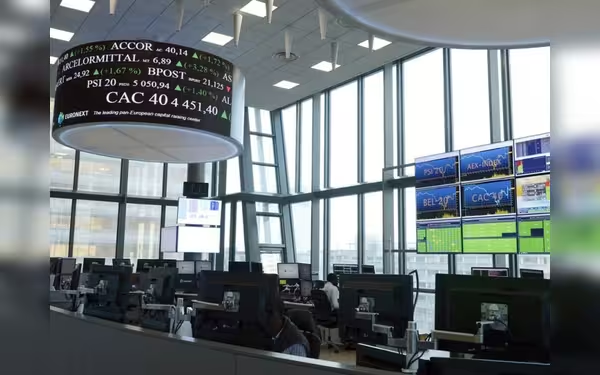Saturday, November 16, 2024 05:30 PM
European Stocks Plummet Amid US Selloff and Chinese Economic Concerns
- European stocks hit two-week low amid global market fears.
- China's manufacturing slump impacts luxury stocks in Europe.
- Investors remain cautious ahead of upcoming economic data.
 Image Credits: brecorder
Image Credits: brecorderEuropean stocks decline sharply as fears of US slowdown and Chinese economic issues weigh on markets.
European stocks experienced a significant downturn on Wednesday, reaching a two-week low as global markets reacted to fears of a potential slowdown in the United States and ongoing weaknesses in the Chinese economy. The pan-European STOXX 600 index saw a decline of 1%, with all major European markets falling between 0.7% and 1%. This downward trend followed a notable selloff on Wall Street, where the main indexes recorded their largest daily percentage drops since early August, primarily driven by disappointing manufacturing data.
In August, China's manufacturing activity plummeted to a six-month low, which heavily impacted luxury stocks in Europe, including major players like LVMH Holdings, Richemont, and Christian Dior. According to analysts, "Fresh worries about the health of the global economy are gripping markets." This sentiment was echoed by concerns regarding the services industry in China, which also reported disappointing new order growth, further contributing to the prevailing pessimism. Additionally, the recent fluctuations in big tech stocks have added to the anxiety among investors.
Despite the current selling pressure, it is noteworthy that European equities remain 7.5% higher for the year. This resilience can be attributed to the optimistic outlook for lower borrowing costs in 2024, which has helped keep the markets buoyant. However, on this particular day, semiconductor companies were among the hardest hit, with ASML Holdings experiencing a nearly 5% drop following a downgrade by UBS, alongside a significant decline in Nvidia's stock.
In terms of economic indicators, the euro zone's business activity received a temporary boost from France hosting the Olympic Games last month. However, experts predict that the underlying malaise in the region is likely to resurface once the Paralympics conclude, as demand remains weak. A survey released on Wednesday indicated that growth in Germany's services sector has slowed for the third consecutive month in August, signaling that Europe’s largest economy is losing momentum.
Looking ahead, the release of July's producer prices data at 0900 GMT is expected to provide further insights into the region's interest rate outlook. Among individual stocks, Commerzbank saw a decline of 2.5% after the German government announced its intention to reduce its stake in the lender. Similarly, Barratt fell by 2.1% after the British housebuilder reported a 56% slump in its annual profit, citing that housing demand remains sensitive to mortgage affordability. Direct Line Insurance Group also faced challenges, declining 1.5% after missing expectations for its half-year operating profit, particularly struggling to revitalize its motor insurance segment.
The current state of European markets reflects a complex interplay of global economic concerns, particularly regarding the United States and China. Investors are advised to remain vigilant as they navigate these turbulent waters, keeping an eye on upcoming economic data that could influence market trends. Understanding these dynamics is crucial for making informed investment decisions in an ever-changing economic landscape.













